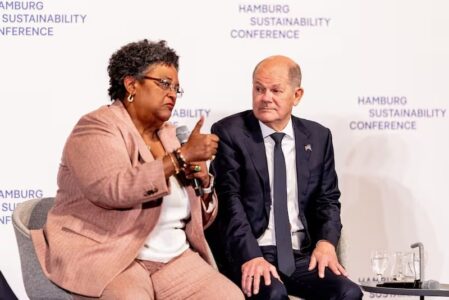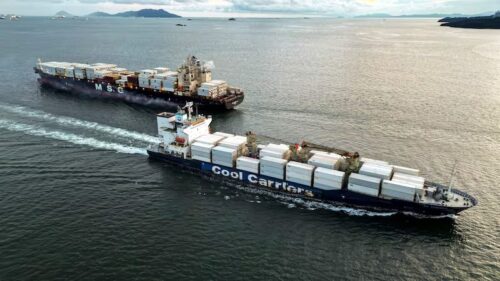Rich countries cannot dictate that poorer ones should use fewer cars in the name of tackling climate change, German Chancellor Olaf Scholz has said.
Mr Scholz told a sustainability summit on Monday not to set itself “against growth” but seek “prosperity for all” in the battle to save the planet. He said Germany was inviting about $20 billion of investment in a hydrogen grid that could help it produce greener steel for its car industry.
Leaders heard UN anti-poverty goals meant to combine development with green thinking have been knocked off course by crises such as the wars in the Middle East and Ukraine. Mr Scholz said the world had failed to make “good enough progress” as a 2030 deadline draws closer.
He said managing a future world with 10 billion inhabitants and new economic powerhouses in Asia, Africa and South America would require “equal-footed co-operation”. UN talks on climate change and other issues are often plagued by divisions between rich and poor nations.
Germany cannot dictate that “there will be fewer cars in Africa, South America or Asia as we have today in North America or in Europe”, Mr Scholz told the Hamburg Sustainability Conference. “They want to have the same standard of living we have today.
“Every individual person has to have the opportunity not to live in poverty, to lead a better life. Prosperity for all is a global goal,” he said. “We should not be against growth. Being at a sustainability conference, it is key that we understand it is about growth.”

The costs of turning the global economy green are expected to run into the trillions of dollars but budgets are under strain due to wars, economic turmoil and the Covid-19 pandemic. Countries such as Ghana, Sri Lanka and Zambia have defaulted on their debt in recent years.
UN development official Achim Steiner said the budget crunch meant countries were struggling to meet sustainable development goals, a set of 17 wide-ranging targets covering poverty, hunger, education, health, clean energy and nature.
“For many, least developed countries, they have literally been priced out of the financial markets. They cannot borrow any more money,” Mr Steiner told the conference. “It’s a very extreme situation.”
Mia Mottley, Prime Minister of Barbados, used the talks in Germany to lobby for a tax on global shipping and aviation that could help plug the financial gaps. A levy of 1 per cent in the maritime sector would raise billions for green ships and wider environmentally friendly policies, she said.
While the world is moving in the right direction, “tortoises move in the right direction, too, and it doesn’t mean they’re going to make the destination”, Ms Mottley said. “It is now absolutely essential that we think outside of the box.”

Mr Scholz said Germany would support so-called green shipping corridors in which low-emission methods are used on particular sea routes. It also hopes to import hydrogen to ports such as Hamburg, where a first test shipment of ammonia arrived from the UAE in 2022.
Hydrogen is regarded as an alternative fuel in sectors such as shipping and steelmaking where there is little room for electrification. Steel accounts for about a third of Germany’s industrial greenhouse-gas emissions and is key to its car exports.
“If investors are deciding to invest … because of the expectations of exporting green hydrogen to industrial countries, it is necessary that they have some clarity that there is a customer. I can assure you we are one of the countries,” said Mr Scholz, a former mayor of Hamburg.



